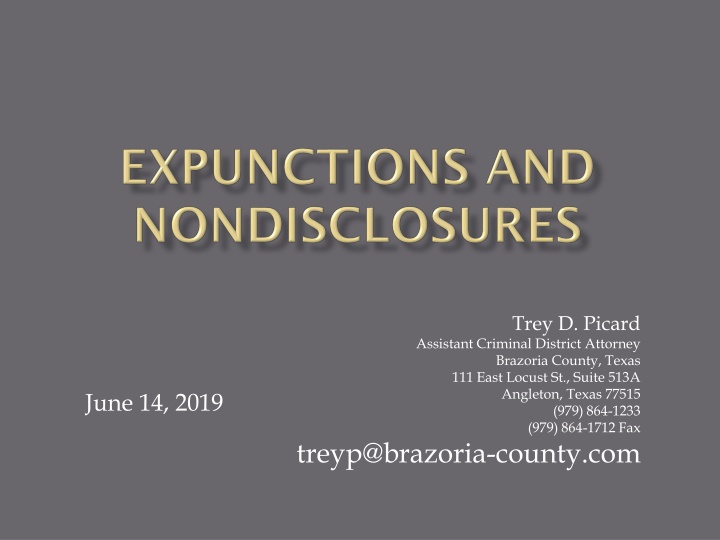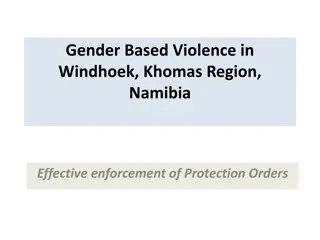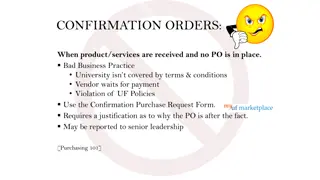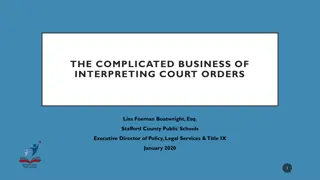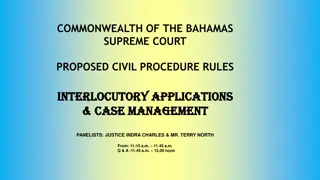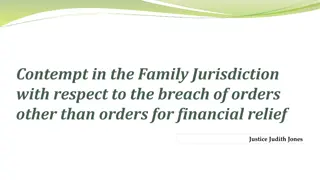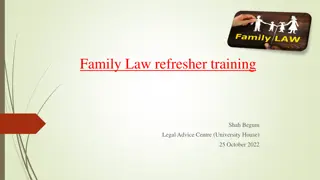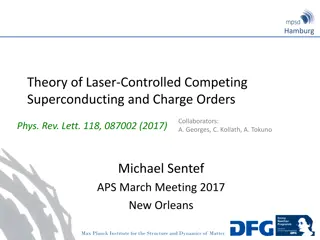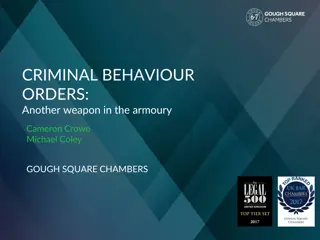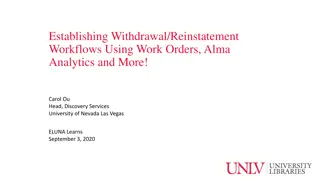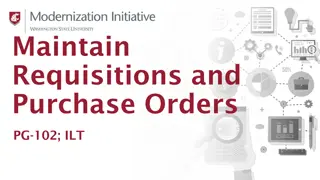Legal Procedures for Acquittals and Expunction Orders
This content discusses the legal aspects surrounding acquittals in criminal cases, including when expunction orders are necessary. It covers specific procedures, such as the requirements for expunction after an acquittal, exceptions to the rule, and the definition of a criminal episode. The content also details the process for obtaining expunction orders in different court settings. Understanding these legal procedures is crucial for individuals involved in similar legal situations.
Download Presentation

Please find below an Image/Link to download the presentation.
The content on the website is provided AS IS for your information and personal use only. It may not be sold, licensed, or shared on other websites without obtaining consent from the author.If you encounter any issues during the download, it is possible that the publisher has removed the file from their server.
You are allowed to download the files provided on this website for personal or commercial use, subject to the condition that they are used lawfully. All files are the property of their respective owners.
The content on the website is provided AS IS for your information and personal use only. It may not be sold, licensed, or shared on other websites without obtaining consent from the author.
E N D
Presentation Transcript
Trey D. Picard Assistant Criminal District Attorney Brazoria County, Texas 111 East Locust St., Suite 513A Angleton, Texas 77515 June 14, 2019 (979) 864-1233 (979) 864-1712 Fax treyp@brazoria-county.com
Acquittals CCP arts. 55.01(a)(1)(A) & (B) , 55.02 sec. 1 Dismissals CCP arts. 55.01(a)(2)(A) & (B), 55.02, sec. 2 After indictment or information limitations must run Pre-indictment (no action) / JP Dismissals waiting period must expire Misuse if Identity CCP arts. 55.01(d), 55.02, sec. 2a Does not apply to juvenile detentions. See also Tex. Dep t of Pub. Safety v. J.H.J., 274 S.W.3d 803, 806 (Tex. App. Houston [14th Dist.] 2008, no pet.) (person is not entitled to expunction until all of the statutory conditions are met; judicial clemency under article 42.12 of the Code of Criminal Procedure does not satisfy the requirements for expunction). 3
CCP art. 55.01(a)(1)(A) Must be tried and acquitted. Exception: offense for which the person was acquitted arose out of a criminal episode, as defined by Section 3.01, Penal Code, and the person was convicted of or remains subject to prosecution for at least one other offense occurring during the criminal episode. See id. art. 55.01(c). 4
Applies if defendant was acquitted by the trial court, court of appeals or Court of Criminal Appeals, or was pardoned. Does not apply to NGRI, or if there is a conviction for another offense arising from the same criminal episode. Petitioner only needs to give the court the required identifying information and give notice to the State. Order is expedited and fees are waived if submitted within 30 days otherwise, normal filing fees and procedures apply. 5
An expunction order for an acquittal must be signed by the court that tried the case, if the court was a district court, JP court or a municipal court of record. Otherwise, the expunction order must be submitted to a district court in the same county. See CCP art. 55.02, 2 If the acquittal in a County Court at Law in Brazoria County, e-file the expunction order with the district clerk within 30 days. The order will be assigned a civil cause number and sent to a district court for signature. No fees are required. 6
Criminal episode refers to the commission of two or more offenses under the following circumstances: (1) the offenses are committed pursuant to the same transactionor pursuant to two or more transactions that are connected or constitute a common scheme or plan; or (2) the offenses are the repeated commissionof the same or similar offenses. See Tex. Penal Code 3.01. 7
If your client has multiple charges arising from a single arrest and he is found guilty or enters a plea as to one charge, any other charge that is dismissed may be expunged if the dismissed charge is not related to the offense for which the client was convicted or placed on deferred adjudication. 8
State v. T.S.N., 547 S.W.3d 617 (Tex. 2018) Petitioner was arrested for two unrelated charges theft and assault. Pleaded guilty to theft, but was acquitted of the other unrelated assault charge for which she had an outstanding warrant. State argued that because petitioner was simultaneously arrested and one charge led to a conviction and the other to an acquittal, the she did not meet criteria for expunction. 9
Texas Supreme Court concluded the expunction statute did not support the State s arrest-based interpretation and affirmed the court of appeals' judgment that the petitioner was entitled to expunction relating to the assault charge of which she was acquitted. State v. T.S.N. applied only to acquittal expunctions under (a)(1), but the Fourteenth Court of Appeals extended the holding to dismissals under (a)(2). See Ex parte N.B.J., 552 S.W.3d 376 (Tex. App. Houston [14th Dist.] 2018, no pet.) ( we disagree with DPS that the unit of measurement in the expunction statute is the arrest, and that, therefore, all of the offenses charged in an arrest must satisfy the statutory requirements before a petitioner may be granted expunction; case does not specify the charges) 10
If he qualifies for a nondisclosure on the charge to which he entered a plea, include any other dismissed charges arising from the same criminal episode in your nondisclosure petition and order. *HB 566 adds Gov t Code 411.0726 for nondisclosures for offenses resulting in an acquittal or dismissal, which arose from a single criminal episode in which the petitioner was convicted or placed on deferred for at least one offense; (died in committee). Use the same procedure if the case starts as a felony and is dismissed and re-filed as a misdemeanor, provided the disposition of the re-filed qualifies for a nondisclosure. 11
Petitioner carries the burden to show all of the statutory requirements have been met. See Harris Cty. Dist. Attorney s Office v. Hopson, 880 S.W.2d 1, 3 (Tex. App. Houston [14th Dist.] 1994, no writ) Procedures set out in Article 55.02 are mandatory and must be complied with during an expunction hearing. See Tex. Dep t of Pub. Safety v. Riley, 773 S.W.2d 756, 758 (Tex. App. San Antonio 1989, no writ) include some evidence Example: when the record shows that DPS was not notified of the hearing there is a violation of the statute and the expunction order must be set aside. See Rodriguez v. T.M.B., 812 S.W.2d 449, 450 51 (Tex. App. San Antonio 1991, no writ) (reversing trial court and setting aside expunction order after finding that hearing took place without notice to respondent) 12
CCP arts. 55.01(a)(2)(A) & (B) Charge has not resulted in a final conviction and is no longer pending. No court-ordered community supervision under Chapter 42A for the offense, except for Class C misdemeanors. If charging instrument was presented (indictment or information filed beyond JP court) limitations must expire. If no indictment or information was filed (i.e., JP dismissals) waiting period must expire: 180 days for Class C misdemeanor, 1 year for Class A or B misdemeanor, and 3 years for felonies. See CCP art. 55.02(a)(2)(A)(i)(a), (b) & (C). 13
Attorney representing the state certifies that the applicable arrest records and files are not needed. Person completed a pretrial intervention program authorized under Section 76.011, Government Code. Indictment or information was dismissed or quashed because the person completed a veterans treatment court program created under Chapter 124, Government Code. Presentment had been made because of mistake, false information, or other similar reason indicating absence of probable cause at the time of the dismissal to believe the person committed the offense. 14
Expunction is available if the indictment or information was void; e.g., statute held unconstitutional. See Ex parte E.H., No. 02-17-00419-CV, 2018 WL 4050556 (Tex. App. Fort Worth Aug. 16, 2018, pet. filed Oct. 1, 2018) (online solicitation of minor statute held unconstitutional; if the indictment was dismissed because it was void, then regardless of whether time of any sort was served, the applicant is entitled to expunction). See also Texas Education Agency v. S.E.H., 571 S.W.3d 372, 373-77 (Tex. App. Houston [1st Dist.] 2018, pet. filed Jan 28, 2019) (teacher pleaded to deferred to unconstitutional online solicitation of minor statute; TEA resisted in case applicant wanted to re- apply for teaching certification; trial court did not err by granting S.E.H. s petition for expunction). Application for habeas corpus (11.07 or 11.072) may be necessary. 15
CCP art. 55.01(b), (b-1) A justice court or a municipal court of record may expunge records pursuant to art. 55.02 if the person is tried and acquitted for the offense, convicted of the offense and acquitted by a court of appeals, or Attorney representing the state recommends the expunction, regardless of whether an indictment or information has been presented. A justice court or a municipal court of record may only expunge records and files that relate to the arrest of a person for an offense punishable by fine only. See CCP art. 55.01 (2)(b-1) 16
Can be used only once. A district court may grant an expunction immediately upon dismissing the case after the defendant s successful completion of Veteran s Court, so long as the state agrees. CCP art. 55.02, 1a(a-1). If the Veteran s Court is a county court, then use the procedure for acquittals and file in a district court in the same county. State is responsible for drafting the appropriate order. 17
All can be filed in JP court or a municipal court of record. Fine-Only Municipal Offenses under Penal Code 8.07 for fine- only offenses and violations of a municipal ordinance by a child under 15 years old. Juvenile can make a written request to the court after turning 17; applies to first time offenders only. See CCP art. 45.0216 Tobacco Use by a Minor. Must apply directly to the justice or municipal court after turning 17 and completing a tobacco awareness course. See Tex. Health & Safety Code 161.255(a); no limit on using this provision. Alcohol use by Minors. If convicted (as a minor) of no more than one offense under Chapter 1-6 of the Alcoholic Beverage Code, petitioner can make a written request under oath to the convicting court after turning 21; applies to first time offenders only. See Tex. Alcoholic Bev. Code 106.12(a)-(c). 18
Arresting Agency Sheriff / County Jail Justice of the Peace District Clerk County Clerk District Attorney Dept. of Public Safety Office of Court Administration (OCA) NCIC and the FBI do not need to be included in the petition. Additionally, private agencies (e.g., newspapers and bondsmen) are not subject to expunction orders unless they purchase criminal history information from DPS (e.g. PublicData.com). Note: all respondents are entitled to at least 30 days notice of the hearing. See CCP art. 55.02, 2(c). 20
OCA Expunctions Legal Division 205 W. 14th Street, Suite 600 Austin, Texas 78701 ocaexpunctions@txcourts.gov They will remove expunged information from the Texas E-file system. 21
BCDA does not agree to expunctions or discretionary expunctions. The petition should be verified by the petitioner not the attorney. Confirm with the court whether your client may be excused from the hearing. Include language in the expunction order allowing the district clerk to fax notice of the order to all respondents. The expunction order should not be signed sooner than the hearing date, even if the BCDA is unopposed. Be prepared to pay for sending notice of the order following the hearing. 22
CCP 55.01(d) identifying information was falsely given by the arrested person without the petitioner s consent and the only reason the information is in the record is that the arrested person falsely gave that information. In 2017, Texas Legislature expanded this to include people actually arrested due to a clerical mistake. Only information expunged is the petitioner s name, address, date of birth, driver s license number, and social security number all other information about the offense remains. Requires the state to verify the petition and submit the petitioner s fingerprints to DPS. 23
SB 562 allows for expunction following a trial court s dismissal of a case after a defendant s successful completion of a mental health court program created under Gov t Code Chapter 125; expunction must still be filed in a district court; sent to governor for signature. SB 346 / HB 4170 change to fees charged on certain expunctions and mailing notice; sent to governor for signature. 24
Automatic nondisclosures 1) Traditional nondisclosures 2) Misdemeanor probation 3) Misdemeanor conviction 4) DWI regular probation 5) DWI conviction 6) Veteran s Court 7) Human Trafficking 8) 27
Govt Code 411.074 a person may not receive a nondisclosure if: (1) the person requests the order of nondisclosure for, or the person has (EVER) been previously convicted of or placed on deferred adjudication community supervision for: (A) an offense requiring registration as a sex offender under Chapter 62, Code of Criminal Procedure; (B) an offense under Section 20.04, Penal Code, regardless of whether the offense is a reportable conviction or adjudication for purposes of Chapter 62, Code of Criminal Procedure; (C) an offense under Section 19.02, 19.03, 20A.02, 20A.03, 22.04, 22.041, 25.07, 25.072, or 42.072, Penal Code; or (D) any other offense involving family violence, as defined by Section 71.004, Family Code; or (2) the court makes an affirmative finding that the offense for which the order of nondisclosure is requested involved family violence, as defined by Section 71.004, Family Code. 28
Deferred adjudication for any misdemeanor not found in Penal Code Chapters: 20, 21, 22, 25, 42, 43, 46, and 71. First time offender no prior conviction or deferred adjudication for any offense other than a fine-only traffic violation at any time Complete deferred adjudication and a 180-day waiting period beginning when the defendant is placed on deferred adjudication; if probation lasts more than 180 days, petitioner will be eligible for a nondisclosure immediately No best interest finding, the court must find it would not be in the interest of justice for the defendant to receive a nondisclosure order State must object at the time defendant is placed on deferred. Tex. Code Crim. P. art. 42.105(f) Only available for offenses where the petitioner received an order of discharge and dismissal on or after Sep. 1, 2017. 29
Deferred adjudication for any felony or misdemeanor and petitioner is ineligible for a nondisclosure under 411.072 Operates like pre-2015 changes. Must complete deferred adjudication and receive discharge and dismissal 5 yr. waiting period for any felony 2 yr. waiting period for misdemeanors under Penal Code Chapters 20, 21, 22, 25, 42, 43, and 46 (no waiting period for other misdemeanors) Waiting period begins when the defendant when he completes deferred adjudication and is discharged Defendant must prove nondisclosure order is in the interest of justice 30
Receive community supervision for any misdemeanor (not felony) offense other than those listed in Alcoholic Beverage Code Chapter 106, or Penal Code 49.04 (DWI), 49.05 (flying while intoxicated), 49.06 (boating while intoxicated), 49.065 (operating amusement park ride while intoxicated), or Penal Code Chapter 71 First time offender no prior conviction or deferred adjudication for any offense other than a fine-only traffic violation at any time Must successfully complete deferred adjudication and receive a discharge, but applies to anyone who served community supervision, even if they served jail time as a condition 2 yr. waiting period for (certain) misdemeanors under Penal Code Chapters 20, 21, 22, 25, 42, 43, and 46 waiting period begins when the defendant completes deferred adjudication; no waiting period for other misdemeanors Petitioner must prove nondisclosure order is in the interest of justice 31
Convicted of any misdemeanor (not felony) offense other than those listed in Alcoholic Beverage Code Chapter 106, or Penal Code 49.04 (DWI), 49.05 (flying while intoxicated), 49.06 (boating while intoxicated), 49.065 (operating amusement park ride while intoxicated), or Penal Code Chapter 71 First time offender no prior conviction or deferred adjudication for any offense other than a fine-only traffic violation at any time Successfully complete deferred adjudication and receive discharge and dismissal, pay all fines, costs and restitution Available immediately upon completion of sentence, if offense was punishable by fine only, or 2 yrs. from the completion of sentence for all other offenses Court may not issue an order of nondisclosure if the court determines that the offense for which the order is sought was violent or sexual in nature other than an offense under Penal Code 22.01 (assault) Petitioner must prove nondisclosure order is in the interest of justice 32
Community supervision for any offense under Penal Code 49.04 (driving while intoxicated) except for the BAC >0.15 enhancement of 49.04(d); applies to any community supervision under 49.04, even if the petitioner was required to serve jail time as a condition Successfully complete community supervision including payment of all fines, costs and restitution No prior convictions or deferred adjudications for any offense, other than a fine-only traffic offense Petitioner must also show issuance of the order is in the interest of justice AFFIRMATIVE DEFENSE: not eligible if the State proves the offense resulted in a motor vehicle accident; accident does not have to include an injury, just the presence of another person even a passenger in the petitioner s car. 2 yr. waiting period if the terms of community supervision included an interlock device for at least 6 months; 5 yr. waiting period if the terms of community supervision did not include an interlock device as a condition 33
Convicted of any offense under Penal Code 49.04 (driving while intoxicated) except for the BAC >0.15 enhancement of 49.04(d), and not otherwise eligible under 411.0731 Successfully complete community supervision including payment of all fines, costs and restitution No prior convictions or deferred adjudications for any offense, other than a fine-only traffic offense Petitioner must also show issuance of the order is in the interest of justice AFFIRMATIVE DEFENSE: not eligible if the State proves the offense resulted in a motor vehicle accident; accident does not have to include an injury, just the presence of another person even a passenger in the petitioner s car. 3 yr. waiting period if the terms of sentence included an interlock device for at least 6 months; 5 yr. waiting period if the terms of community supervision did not include an interlock device as a condition 34
Completion of a Veterans Court Program under Govt Code Chapter 124 Applies whether the defendant was convicted of the offense, placed on deferred, or the case was dismissed (but if the case was dismissed, the defendant may be eligible for an expunction) Not eligible if defendant s entry into the program was a result of a conviction of an offense involving operation of a vehicle while intoxicated Any prior conviction for an offense under CCP art. 42A.054(a) (the former 3g offenses ) or any sexually violent offense make the defendant ineligible 2 yr. waiting period from successful completion of the program, and must be in the interest of justice 35
Convicted of Class B or Class C Theft, prostitution or promotion of prostitution, or Class B possession or delivery of marihuana and sentenced to regular probation Must have conviction set aside under art. 42A.701(f) and convince the judge he committed the offense solely as a victim of human trafficking No prior nondisclosure under this section Must be in the interest of justice Allows the defendant to skip the 2-yr. waiting period required under 411.073 36
Check your clients criminal record. OCA has forms and instructions for nondisclosures for all current subsections. Letter Form request for the $28 section 411.072 automatic and easy nondisclosure must be hand-filed by the client, for now. Send notice of the hearing to DA only if there s no objection it may be approved as to form a hearing may be unnecessary. https://www.txcourts.gov/rules-forms/orders-of-nondisclosure/ 37
Check to see if your client finished probation and was successfully discharged. County Court 3 requires a prove-up; check with other courts to see if your client needs to appear; if not, include some evidence Have the clerk send notice of the order to the JP court that first handled the case; include the JP number. 38
Not later than 15 business days after the order issues, the clerk of the court is required to send relevant criminal history record information contained in the order or a copy of the order to the Crime Records Service of the Texas Department of Public Safety. Not later than 10 business days after receipt of a copy of the order from the clerk, DPS must seal the criminal history record information that is the subject of this order and forward the information or a copy of the order to the state and federal agencies listed in Gov t Code 411.075(b), which include: (1) law enforcement agencies, jails or other detention facilities, magistrates, courts, prosecuting attorneys, correctional facilities, central state depositories of criminal records, and other officials or agencies or other entities of this state or of any political subdivision of this state; (2) central federal depositories of criminal records that there is reason to believe have criminal history record information that is the subject of the order; and (3) private entities that purchase criminal history record information from the department or that otherwise are likely to have criminal history record information that is subject to the order. Not later than 30 business days after receipt of relevant criminal history record information contained in an order from DPS, an entity described by 411.075(b)(1) shall seal any criminal history information maintained by the or entity that is the subject of the order. 39
Petitioner is not required in any application for employment, information, or licensing to state that the person has been the subject of any criminal proceeding related to the information that is the subject of the order. SeeGov t Code 411.0755 But information may be disclosed to other criminal justice agencies, or the noncriminal justice agencies listed in Gov t Code 411.0765(b). Information may also be admitted as evidence in the trial of a future offense, if admissible under the Rules of Evidence. SeeGov t Code 411.0775. 40
SB 20 / SB 1801 make procedural changes for nondisclosures for victims of human trafficking and add a provision for nondisclosures for defendants who assist law enforcement; signed by governor. HB 3582 adds Gov t Code 411.076 and removes DWI and BUI deferred adjudications from 411.072 and 411.0275 and allowing nondisclosures for deferred adjudications for any offense under Penal Code 49.04 or 49.06; must be a first time offender; no accident involving another person; 2 yr. waiting period after discharge; applies to offenses committed after Sept. 1, 2019; sent to governor for signature. 41
SB 550 creates eligibility for the records of an offense and conviction that have been set-aside by a judge under CCP art. 42.701(f)) (also called judicial clemency) to be sealed through an order of nondisclosure; must satisfy 411.074 and be in the interest of justice; 2 yr. waiting period for misdemeanors and 5 yr. waiting period for felonies; signed by governor. HB 714 streamlines Veteran s Court nondisclosures by adding 411.029, stating that on successful completion of a veterans reemployment program, and all other conditions of the defendant's community supervision, including deferred adjudication community supervision, and a hearing on whether issuance of an order is in the best interest of justice, the court shall enter an order of nondisclosure with respect to all records of the offense for which the defendant was placed on community supervision; signed by the governor. 42
